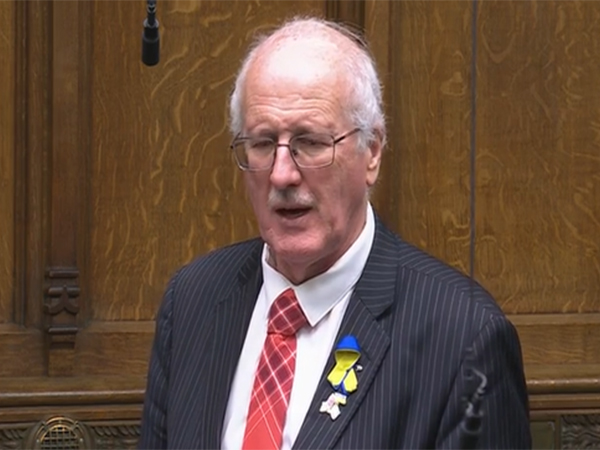UK’s Member of Parliament for Strangford and Chair of the All-Party Parliamentary Group (APPG) for International Freedom of Religion or Belief, Jim Shannon, has expressed grave concerns over the “widespread forced conversions and human rights abuses of minority religious groups” in Pakistan.
Shannon also deplored the “lack of action by the Pakistani government”. He lamented that “legislative and societal frameworks in Pakistan have created an environment where intolerance thrives.”
He made these remarks during a recent session of the UK Parliament, where the freedom of religion in Pakistan was discussed.
Shannon, who has visited Pakistan twice, in 2018 and 2023, emphasised that conditions for religious minorities have worsened over the past five years. He described the situation as dire, with Christians, Hindus, Ahmadis, and Shia Muslims regularly facing discrimination, violence, and persecution.
He said, “I visited Pakistan on two occasions in 2018 and 2023. I would love to say that things have changed in Pakistan in those intervening five years, but they have not. Indeed, they have got worse, and I will go into more detail on that as we move forward.”
He said that in Pakistan “Textbooks continue to perpetrate stereotypes, fostering intolerance among the next generation.”
“Minority students are forced to study Islamic content, isolating them further in a society already fraught with prejudice. Economic discrimination compounds those challenges. Non-Muslims are often relegated to low-status jobs with limited opportunity for social or professional mobility. That systematic marginalisation keeps them in a cycle of poverty and vulnerability,” he elaborated.
Shannon attributed the widespread intolerance to Pakistan’s legal and societal frameworks, particularly the blasphemy laws introduced during General Zia ul-Haq’s regime. These laws, he stated, are among the harshest in the world and are frequently weaponized against religious minorities.
He said, “Let me put this in plain language that we can all understand: the reality of the situation in Pakistan is dire. It is critical. It is at crisis point. In fact, I can understand why some people feel utterly hopeless. Pakistan is a lovely nation, with a rich and diverse history, but it remains fraught with challenges for its religious minorities.”
“Christians, Hindus, Ahmadis and Shia Muslims face widespread discrimination, persecution and violence on a regular basis. The legislative and societal frameworks in Pakistan have created an environment where intolerance thrives. If we let something happen once, twice, three times, then 10 times, it becomes the norm. That is what has happened to religious minorities in Pakistan,” he added.
Shannon highlighted the disturbing trend of young girls, particularly from Christian and Hindu communities, being abducted, forcibly converted to Islam, and married to their captors. “In Sindh province alone, the practice has become alarmingly common, with inadequate legal protections allowing perpetrators to evade justice. There is something wrong with a society that can let a 14 or 12-year-old, or anyone who is still under the care of their parents, be taken away, abducted and married against their will,” he said.
He cited reports from the Dignity First 2024 report, which detailed over 70 violent incidents targeting Christians, including forced conversions and abductions.
He also mentioned the case of Saima Bibi and Reeha Saleem, two young women who were recently rescued from forced marriages. However, he stressed that many others remain trapped in similar situations, with little recourse to justice.
The UK MP also addressed the persecution of the Ahmadiyya Muslim community in Pakistan, which has faced systematic discrimination since being declared non-Muslims by the state in 1974. The desecration of Ahmadi mosques and graves, along with widespread hate speech and mob violence, has become a routine occurrence, Shannon explained.
He also pointed to the plight of Shia Muslims in the Parachinar region, where they continue to suffer attacks from extremist groups, including the Taliban and ISIS-affiliated organizations.
Shannon pointed out that despite Pakistan’s constitution ostensibly guaranteeing religious freedom, religious minorities face significant obstacles. These include marginalization in education, economic discrimination, and being relegated to low-status jobs. He particularly highlighted the exploitation of Christian labourers in brick kilns, who often work in appalling conditions and are effectively bound to their employers indefinitely.
Shannon called on the UK government to use its influence to advocate for meaningful change in Pakistan. He urged the Minister to press for reforms to the blasphemy laws, provide resources for NGOs working to rescue and rehabilitate victims of forced conversion and marriage, and demand stronger legal protections for vulnerable girls and women. He also stressed the need for an independent police force in Pakistan that would apply the rule of law impartially.
The debate culminated in a resolution expressing the UK Parliament’s concern over the deteriorating religious freedom in Pakistan. The motion called for an end to forced conversions, human rights abuses, and the arrest of opposition religious leaders by local authorities. It also emphasized that the Pakistani government’s failure to address these issues constitutes a serious violation of Article 18 of the Universal Declaration of Human Rights.
Shannon’s speech and the subsequent resolution underscore the UK’s commitment to defending religious freedom worldwide, and the urgent need for international action to address the systemic persecution of religious minorities in Pakistan.

